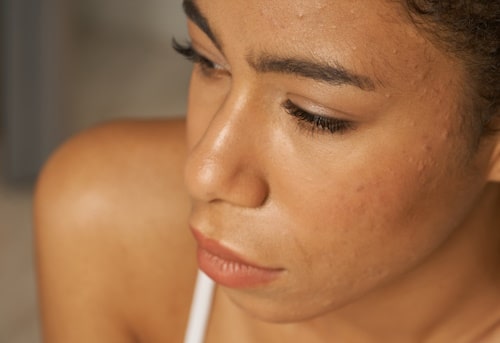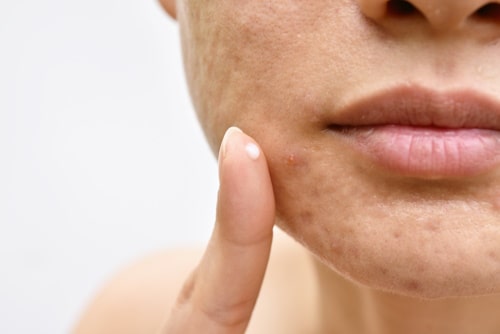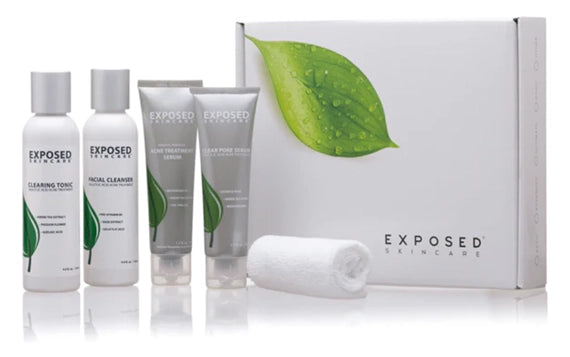Often, the topic of acne only comes into the discussion during pregnancy. Not many women are aware of the possibility of experiencing acne after a miscarriage. However, it is not something one should just sweep under the rug.
This sudden onset of breakouts can be surprising and distressing. In this article, we delve deep into the reasons behind "acne after miscarriage" and provide insights into treatments and remedies for managing it.
Also read: How to choose the best acne treatment
Biggest Take-Aways:
- Hormonal changes, especially after events like miscarriages, play a significant role in triggering acne.
- Recognizing the type of acne, whether hormonal or cystic, is essential for appropriate treatment.
- Lifestyle changes like relaxation techniques and maintaining a sleep routine can complement acne treatments.
- Exposed Skin Care offers a blend of natural and scientific ingredients tailored to address hormonal acne effectively.

Hormonal Changes: The Main Culprit
Understanding the Role of Hormones in Acne
Hormones play a significant role in our body's function, and any slight changes in hormone levels can impact our skin. During pregnancy, levels of hormones like progesterone surge, which often leads to increased oil production from sebaceous glands.
This increased oil production can cause clogged pores, making it easy for acne to occur. Following a miscarriage, these hormone levels return to normal, which can trigger acne breakouts in some women.
How Hormonal Acne Differs From Other Types
Hormonal acne often appears in the form of cystic acne, which are deeper pimples that can be painful. Unlike surface-level pimples, cystic acne forms deeper within the skin and can last anywhere on your body for weeks or even months.
Recognizing the symptoms of hormonal acne, such as the onset of breakouts following significant physical and emotional events like a miscarriage, can help identify appropriate treatment options.

Why Acne After Miscarriage?
The occurrence of acne after a miscarriage, often referred to as postpartum acne or post-pregnancy acne, is primarily due to changes in hormone levels. When a woman miscarries, there's a rapid drop in pregnancy hormones like progesterone. This hormonal roller coaster can stress the body, triggering acne breakouts.
Further, while trying to conceive or immediately following a miscarriage, your body produces various hormones that can cause acne. This acne might be a minor breakout for some women, while others may experience severe acne, including the formation of nodules.
Managing Acne After Miscarriage: Treatment Options
Over-The-Counter Topical Treatments
- Salicylic Acid: This ingredient helps to unclog pores by breaking down dead skin cells. It's safe to use and can be found in numerous acne treatments and face wash products.
- Benzoyl Peroxide: Effective in killing bacteria, this ingredient can clear your skin and prevent further breakouts.
- Azelaic Acid: It helps to reduce inflammation and kill bacteria, making it an effective spot treatment.
Safe Skincare Practices
Ensuring you wash your face regularly, especially if you're struggling with acne, can make a significant difference. Using skin care products that won’t clog your pores is crucial. Remember to remove makeup before bed and use gentle exfoliators to remove dead skin cells.
Prescription Medications and Treatments
- Topical Retinoids: These are derived from vitamin A and can unclog pores, thus helping with acne breakouts. However, check with your healthcare provider before starting any medication, especially if breastfeeding.

- Isotretinoin: This medication might be an option for those with extremely severe acne who don’t respond to other treatments. However, ensuring it’s safe to use is essential, especially if you're considering getting pregnant again.
- Birth Control Pills: These can regulate hormone levels in the body, thus reducing the chance of acne. However, their safety during pregnancy or while trying to conceive must be verified.
Lifestyle Changes That Can Help
- Relaxation Techniques: Given that physical and emotional stress can trigger acne, relaxation techniques such as yoga and meditation can help reduce acne after a miscarriage.
- Dietary Adjustments: Some foods are known to cause acne or make it worse. Avoiding these can potentially help in managing acne breakouts.
- Maintaining a Sleep Routine: A lack of sleep can exacerbate acne. Ensuring you get adequate rest can be beneficial in managing acne during this time.
Benefits of Using Exposed Skin Care for Acne Management
Managing acne can be challenging, given the physical changes and emotional turmoil one goes through after a miscarriage. Exposed Skin Care understands these concerns and strives to provide a holistic solution.
Some benefits of Exposed Skin Care are:
- Targeted Solutions: Exposed Skin Care treatments address the root cause of breakouts, be it sebum production, dead skin cells, or bacterial presence.
- Safe During Pregnancy: If you get acne during pregnancy, using products safe during this period is crucial. Exposed Skin Care ensures that their topical acne treatments are gentle and safe, whether you’re breastfeeding or expecting a healthy pregnancy.
- Quick Results: Many users find that their acne usually starts to diminish within the past few days of using Exposed Skin Care products. These solutions seem to be helping a broad spectrum of acne types, from the occasional whitehead to more severe forms.
- Natural and Scientific Blend: Exposed Skin Care products are made with natural extracts and advanced scientific ingredients, ensuring they address the cause of breakouts without inducing unwanted side effects.
Remember, as with all acne medications, it's advisable to monitor how your skin reacts over weeks or months. Exposed Skin Care is also best matched with a change in lifestyle to eliminate acne once and for all.
Conclusion
Navigating the complexities of acne, especially when triggered by significant life events such as a miscarriage, is often a journey many women find unexpected and challenging.
The intricate balance of hormones during these periods makes the skin more susceptible to breakouts, and returning to normal can feel daunting. As we've explored, several acne treatments exist, but choosing those tailored to individual needs is crucial.
A personalized approach, understanding your skin's reactions, and adapting treatments are essential. Many professionals may recommend specific remedies based on the kind of acne and its severity.
Exposed Skin Care caters explicitly to the nuanced needs of those experiencing hormonal acne. With a blend of natural and scientific ingredients, they offer hope for many looking to return to normal and embrace clear skin once more.
FAQs
Why does acne occur after a miscarriage?
Hormonal changes, particularly the rapid drop in pregnancy hormones like progesterone, trigger acne following a miscarriage.
Is hormonal acne different from regular acne?
Yes, hormonal acne often manifests as cystic acne, which forms deeper within the skin and can last for weeks or even months.
What are some over-the-counter treatments for acne?
Salicylic acid, benzoyl peroxide, and azelaic acid are common OTC treatments effective against acne.
Is it safe to treat acne during pregnancy?
It's crucial to use products deemed safe during pregnancy. Always consult product labels and professionals if unsure.
How can Exposed Skin Care help with my acne?
Exposed Skin Care combines natural extracts with scientific ingredients to address the root causes of breakouts, ensuring safe and effective treatment for various acne types.


















